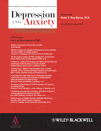 A study in Depression and Anxiety by researchers from Brown Medical School, Rhode Island, examined how many mildly symptomatic depressed patients in ongoing treatment who did not score in the remission range on the 17-item Hamilton Depression Rating Scale
A study in Depression and Anxiety by researchers from Brown Medical School, Rhode Island, examined how many mildly symptomatic depressed patients in ongoing treatment who did not score in the remission range on the 17-item Hamilton Depression Rating Scale
(HAMD) nonetheless considered themselves to be in remission from their depression.
274 psychiatric outpatients (87 men and 187 women who ranged in age from 19 to 80 years) with a diagnosis of major depressive disorder treated for DSM-IV major depressive disorder were rated by the authors on the 17-item HAMD and DSM-IV Global Assessment of Functioning (GAF) Scale. The patients completed several self-report scales including a demographic form, the psychosocial functioning and quality-of-life subscales of the Diagnostic Inventory of Depression (DID),and the Remission from Depression Questionnaire (RDQ). The demographic form included a question regarding the patient’s perception of whether they were currently in remission from depression
Results demonstrated that approximately one-quarter of the patients who did not score in the remission range on the HAMD nonetheless considered themselves to be in remission from depression. The authors explain that they consider remission to be a broader construct than symptom level, a construct that includes other indicators of clinical status such as functioning, quality of life, resiliency in coping with stress, and a general sense of well-being. “It is not surprising that compared to the patients who did not consider themselves to be in remission, the self-described remitters reported better functioning,
better quality of life, better coping ability, and better overall mental health. This is consistent with our clinical experience and explains why some patients with low levels of symptoms, in the so-called nonremission range of symptom severity, nonetheless are not interested in modifications to their treatment.”
The authors point out that these results have implications regarding efforts to adopt measurement-based care in clinical practice. “Although we embrace the concept of
measurement-based care to guide treatment, we believe that a focus on symptoms is overly narrow. A patient may be minimally symptomatic but still functioning well, coping well with stress, feeling optimistic about the future, and feeling self-confident.
Zimmerman M, et al. Depression and Anxiety
Article first published online: 7 AUG 2012







